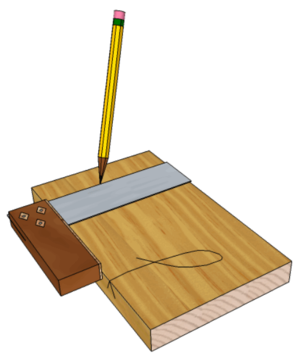Face Side and Face Edge
From DT Online

Modern timber is machined to a high degree of accuracy but this was not always the case. Even now, a length of timber might have one edge which has been cut straight and another which still retains the outside shape of the tree - known as a Waney Edge.
Good practice when marking out timber therefore is to choose the straightest edge and mark this as the Face Edge. Similarly, select the best or flattest surface and mark this as the Face Side as shown.
Throughout any subsequent marking and measuring, the Face Side and Face Edge are used as the Datum Surfaces from which all measurement are taken and against which the stock of a tool such as a Try Square or Marking Gauge is pressed.
Note: Even when Squaring Round (i.e. marking a line all around a piece of timber) a Try Square stock should always be pressed against either the Face Side or Face Edge